Support strong Canadian climate journalism for 2025
Did you know that:
- We Canadians are now one of the world's largest extractors of climate pollution, per capita?
- We're planning one of world's biggest increases through 2030?
- Our relentlessly increasing extraction has become a supersized gamble that threatens both climate hope and our economic stability?
Well, I was certainly surprised by the extreme scale of what we're doing when my spreadsheet spit out the initial numbers. So I asked around and spent weeks researching deeper. Here's what I found out:
It turns out we've built ourselves an economy that must dig up and sell extremely high levels of climate pollution per capita – in the form of fossil fuel carbon — just to function properly. And we are planning absolutely gigantic increases on top of that. This yields well-known short-term benefits from selling so much climate- polluting fuel. But it also carries supersized risks to the stability of our climate and our economy. These are rarely mentioned and are now surging to potentially dangerous levels.
A series of recent reports flash warnings about a perfect storm of clean technology and climate action that threatens to deliver a swift and sizable beating to the markets for oil and coal. And they highlight how Canadian plans for continuing rapid increases threatens us on two fronts. The first threat is global climate failure. The second is an economic crisis in Canada.
Despite the growing risk to both our climate and our economy, Canada's leaders have no "Plan B." Instead, their relentless expansion plans are pushing the country into a no-win situation where our economic stability will directly conflict with our climate stability.
That's the broad brush of Canadians' supersized predicament. Now let's dive into the numbers:
Canadians' supersized carbon dependency
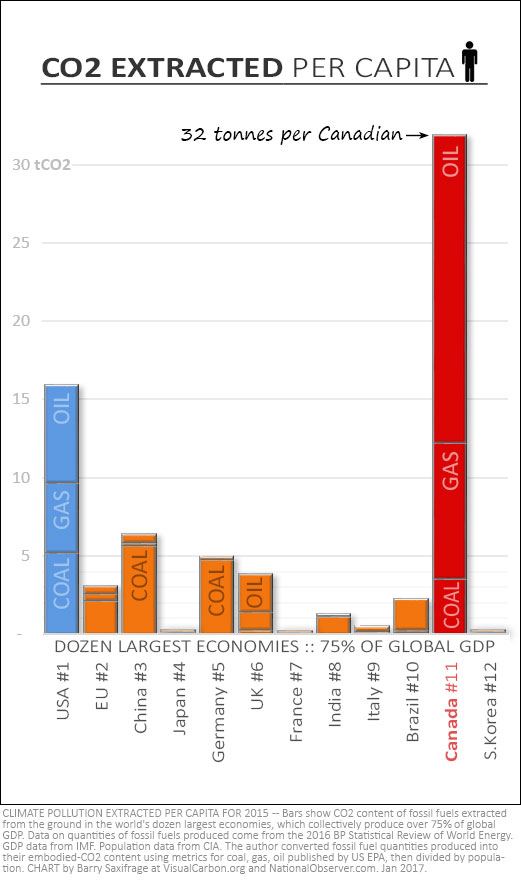
Take a look at my first chart on the right. It shows how much climate pollution is pulled out of the ground, per capita, by each of the twelve largest economies. These nations are arranged by the size of their economies. Together these economies produce 75 per cent of global GDP.
That really, really tall red bar is us. Canadians.
The fossil fuels dug from the ground last year in Canada contained 32 tonnes of CO2 (tCO2) per capita. That's how much climate pollution we now need to be able to sell each year for our economy to function properly.
As the chart shows, we extract twice as much as Americans, five times as much as the Chinese, and ten times as much as the European Union.
There are a few OPEC nations like Kuwait, Qatar and the Saudis that are even more carbon-exposed per capita than Canada. Yikes. And there are other OPEC nations such as Iran, Iraq, Venezuela and Libya, that only extract half as much carbon pollution per capita as we do. Bottom line: Canada is one of the world's dozen largest carbon pollution extractors per capita, and we are certainly at the extreme end among our major economy peers.
The chart also breaks it down by fossil fuel type.
The "oil" part of our tall red bar shows that we already extract a truly massive 20 tCO2 per capita in the form of oil. As we will see below, this alone poses a supersized threat to our hopes to limit global warming to less than 2 degrees Celsius above pre-industrial levels.
Next, let's look at how we got here.
Canadians' supersized expansion
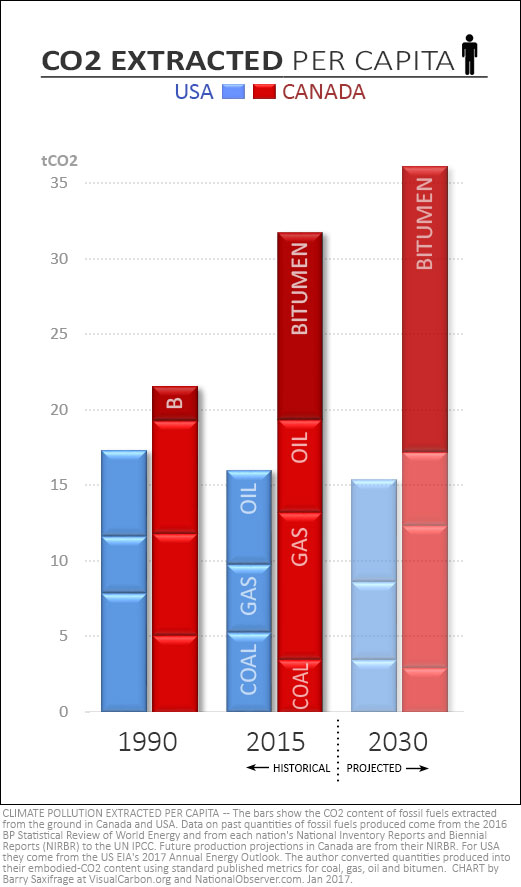
I put together this second chart to illustrate the changes in Canada's extraction levels. It includes both historical and projected levels. And I included the United States for an eye-opening comparison.
As the first column illustrates, back in 1990 Canadians and Americans extracted fairly similar amounts of carbon pollution per capita.
Since then Canadians have dramatically increased how much we dig up -- by an additional 10 tCO2 per capita. Our increase alone dwarfs the entire total of most major economies shown in the first chart. Clearly, we aren't just doing what everyone else is. Instead, we are supersizing our CO2 extraction and with it our climate impact and our carbon dependency.
In contrast, Americans reduced their CO2 extraction since 1990 by a couple of tonnes per capita. They made small increases per capita via new fracked gas and shale oil. These were more than offset by larger declines in the amount of coal they dig up.
The final column shows each government's projections for 2030.
As you can see, the Americans project continuing small declines per capita. Breaking that down, their most recent Annual Energy Outlook projects small increases from oil and gas, offset by a larger decrease from coal.
In contrast, the Canadian government's most recent National Inventory Report to the United Nations projects dramatic and ongoing increases in CO2 extraction per capita. We are headed for around 36 tCO2 extracted per capita in 2030. All the increase is expected from massive increases in bitumen extraction.
Just how extreme would our planned increase be?
A new report from Oil Change International (OCI), "Climate on the Line", surveyed global projections and concluded:
"Over the next twenty years, the industry is set to expand oil production by more in Canada than in any other country. If it continues on this course, Canada could become one of the world’s largest extractors of the new carbon that would drive the atmosphere over the edge."
The numbers show that when it comes to pulling climate pollution out of the ground, Canadians are already among the most extreme in the world. And our future plans are shown to be equally extreme. Unfortunately, such supersized carbon levels also come with supersized risks to our climate and our economy.
Supersizing our climate impact
First let's look at how our plans threaten supersized climate damage.
The OCI's report did the carbon budget math and concludes starkly:
"Canadian government simply cannot have it both ways. There is no scenario in which tar sands production increases and the world achieves the Paris goals."
The report "Extracted Carbon" from the Canadian Centre for Policy Alternatives (CCPA) comes to the same conclusion. It shows that Canadian plans vastly exceed our largest plausible slice of the world's remaining safe carbon-extraction budget. By refusing to live within our share of a safe carbon-extraction budget it says we are pushing global climate safety out of reach.
In addition, the CCPA report says that that we are holding back needed climate action in another way. Our surging levels of extracted carbon are helping to create a global oversupply. This in turn is pushing fossil carbon prices lower. Falling prices for climate-polluting fuels undercut the economics of transiting to climate-safe alternatives in time. As a result, our expansion plans are "locking in" climate failure by "locking in" long lived carbon infrastructure which will continue pumping out climate pollution long after global climate emissions must go to zero.
That's the bad news for our climate. Now here's the bad news for our economy.
Supersizing our economic risk
Our supersized carbon extraction is also supersizing the potential carbon bubble at the heart of our economy.
As mentioned above, there a perfect storm is emerging from intensifying global climate actions and clean technology breakthroughs that threaten to pop our supersized carbon bubble. Let's look at each of these two threats in turn.
ECONOMIC THREAT #1: HUMANITY SAVING ITSELF
The first threat to our extremely carbon-dependent economy is that humanity might do what is needed to avoid a full-blown climate crisis.
Unfortunately, the world has waited too long to transition slowly and gracefully away from fossil carbon. That means we are now at a point where reductions must begin quickly and the decline rate will need to be significant. Says who? Here are just three of the many recent warnings:
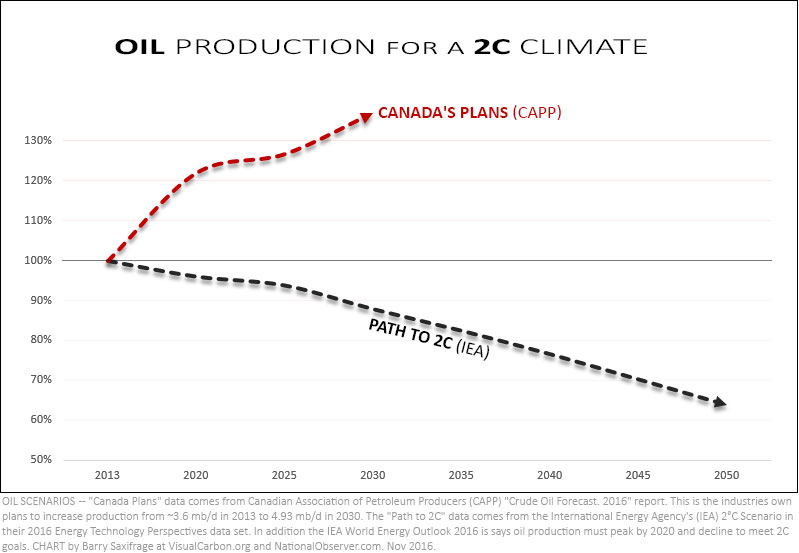
- "Global emissions must be halved in little more than 20 years … to have a likely chance of staying below 2°C according to the OCI "Climate on the Line" report. They did the carbon math using the International Panel on Climate Change (IPCC) Scenarios Database. As my second chart above shows, Canada is planning big increases in CO2 extraction instead.
- A "rapid phase down of fossil fuel emissions" is now required to "avoid dangerous human-made climate change." That's the conclusion of a recent paper, "Young People's Burden", by a global group of climate scientists led by Dr. James Hansen. They warn that failure to do so means the global climate "may become unmanageable. Simply put, the burden placed on young people and future generations may become too heavy to bear." Canada's plans to rapidly increase CO2 extraction threaten to leave young Canadians with a no-win situation in which their hyper-carbon-dependent economy is in direct conflict with their need for a stable climate.
ECONOMIC THREAT #2: CLEANER TECHNOLOGY
The second threat to our extremely carbon-dependent economy is the eye-popping plunge in the costs of cleaner alternatives.
One of the most recent and in-depth reports on this trend is “Expect the Unexpected: The Disruptive Power of Low-carbon Technology.” Carbon Tracker teamed up with the Grantham Institute at Imperial College London to analyze how the "faster than expected" plunge in the costs of electric vehicles (EV) and solar technology (PV) are on track to single-handedly deliver an economic beating to the oil and coal markets. They say that these two technologies alone are primed to:
- Force a peak in global coal and oil demand by 2020, followed by declines.
- Grab a ten percent market share from both coal and oil -- within a single decade. They point out that recent market shifts of this size caused by lower-carbon alternatives nearly bankrupted the coal industry in America, and quickly knocked $150b off the value of the five biggest European utilities.
- Even larger declines in oil and coal demand are possible. That's because the report only considers the impact of two technologies (EV and PV), and because meeting the Paris Accord's global 2C climate target requires much deeper cuts as well. They warn investors, industries and nations who are betting on carbon markets to plan for disruptive declines in the near future.
Plan B anyone?
Hmmm. Both a safe climate and clean technologies are coming into direct conflict with our economic plans. Maybe it's time for a "Plan B" in Canada, eh?
You know, something other than our current "Plan A" of crossing our fingers and gambling it all on black. A recent CBC article pithily summarized the thinking of Canada's business and political leaders: "even the idea of phasing out the oilsands seems, if not impossible, then unlikely enough that it requires no serious consideration." No serious consideration.
Well, fortunately, a few people are willing to discuss the economic risks of "Plan A" and start a conversation about a possible "Plan B". Here are some examples from the reports mentioned above:
- OIC's "Climate on the Line" report warns that Canada's current plan threatens "stranding assets, damaging economies and harming workers and communities reliant on the energy sector … There is no future in expanding tar sands production. Instead, the government should begin serious efforts now to diversify the economy, supporting a just transition for workers and communities." A similar coal-economy meltdown in the Unite States led to widespread anger that helped elect Donald Trump as President. Consider that coal was a much smaller part of their economy than carbon extraction is in ours.
- Carbon Tracker's "Expect the Unexpected" report says that it is critical to include an analysis of a "2C scenario" to understand and manage the risks posed by the low-carbon transition. I've yet to see any energy scenario from our government or industry that explores what would happen in Canada if the world preserved a safe climate system. I mean, it is possible, right? So why the silence?
- CPPA's "Extracted Carbon" suggests: "Canada should aim for a managed transition that steadily removes fossil fuel infrastructure while investing heavily in green infrastructure alternatives. Canada’s exports of fossil fuels do not need to drop to zero immediately, but we cannot pursue policies that further increase extracted carbon." The report provides a list of policy suggestions along these lines.
"Politically impossible"
Some people I talk to about our extreme carbon-dependency say it is just "politically impossible" for our political leaders to transition our economy to one that aligns with a safe climate. My response is: "how do we know? No leader in power has really tried to explain the situation to Canadians and then lead discussions on alternatives. Where are the speeches and reports and commissions? Where is the forum to discuss and evaluate alternatives? Where is the analysis of the risks we face on our current hyper-extraction path?"
And consider this. If our economy is currently too carbon dependent to handle any reduction in how much we extract, just imagine how much worse it will be in a decade or two! On our current path we will be vastly more dependent at a time of vastly greater pressures for even steeper declines. It's just going to keep getting more painful to change course the more we increase our extraction levels. We're already super exposed.
But even if it is "politically impossible" to change in time, that doesn't excuse the ongoing silence from our political, economic and major media leaders. They have an ethical and moral duty to explain the risks and to help Canadians prepare for what could be coming.
At this point, approving new pipelines and green-lighting more carbon extraction are big gambles for both our climate stability and our economic stability. Pretending otherwise is harming Canadians. If our leadership is going to force these risky expansions through, they have an obligation to explain and prepare Canadians for the very real possibilities that these supersized gambles might backfire.
Staying silent while leading Canadians into potential climate failure and/or economic failure is unacceptable.
-----------------------------------------------
Want to read more? Here's a list of primary sources used in this article
- “Expect the Unexpected: The Disruptive Power of Low-carbon Technology.” Carbon Tracker and Grantham Institute at Imperial College London. January 2017. Analyzes the cost trends in PV and EV technologies. Combines this with various scenarios for future climate action. Shows the potential disruption in markets for fossil fuels, especially oil and coal. www.carbontracker.org/report/expect-the-unexpected-disruptive-power-low-carbon-technology-solar-electric-vehicles-grantham-imperial/
- "Climate on the Line: Why New Tar Sands Pipelines are Incompatible with the Paris Goals." Oil Change International. January 2017. Analyzes global oil production forecasts/plans. Compares to remaining climate budgets. Highlights Canada's exceptionally large expansion plans and what they could mean for climate safety. priceofoil.org/2017/01/19/climate-on-the-line-why-new-tar-sands-pipelines-are-incompatible-with-the-paris-goals/
- "Extracted Carbon: Re-examining Canada’s Contribution to Climate through Fossil Fuel Exports." Canadian Centre for Policy Alternatives, by Marc Lee. January 2017. Compares Canada's carbon extraction plans to the remaining global carbon budget for a safe future. It also proposes alternative economic policies that align better with a safe climate future. policyalternatives.ca/publications/reports/extracted-carbon
- "Young People's Burden." Dr. James Hansen and many other climate scientists from around the world. October 2016. Written to support a lawsuit by a group of young people against the U.S. Government. The lawsuit argues that their government isn't doing enough to protect their right to a safe future. The report compares fossil carbon plans and climate actions to safe climate budgets. Explains how current path will force young generation today into extreme levels of carbon capture from the air which could easily prove to be technologically, economically and socially impossible to carry out as climate impacts intensify as well. www.earth-syst-dynam-discuss.net/esd-2016-42/
- "Statistical Review of World Energy." BP's most recent annual report used by energy planners around the world. It lists fossil carbon extraction by nation for last few decades. I used this data when building the "extracted CO2 per capita" charts for Canada and other major economies. www.bp.com/statisticalreview

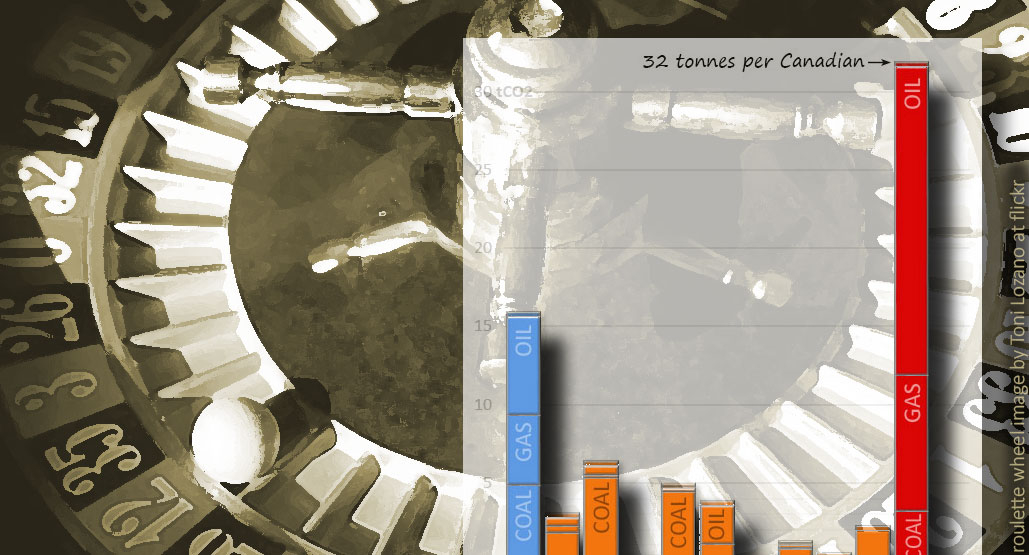

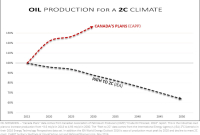
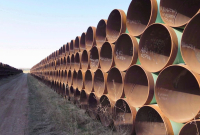

Comments
I would like to see some REAL investigative journalism regarding the whole 'per capita' argument presented...everyone knows the carbon footprint is based on the end user. If most of Canadas product is exported and the end users number the 100's of millions, why does the 'skewed' equation only include our Canadian population? In reality, if the TRUE end user number were taken into consideration, Canada would have one of the LOWEST 'per capita' carbon footprints on the planet.
Per capita carbon footprint include all stages of production, transformation, transport and consumption of products that require energy. The Environment and Climate Change "National Inventory Report 1990-2014: Greenhouse Gas Sources and Sinks in Canada" gives you all emissions by economic sectors and by provinces. Canada's 2016 "Second Biennial Report Submission to the United Nations Framework Convention on Climate Change (UNFCCC)" is even more interesting as it gives more detail informations on GHG emissions in Canada. It shows in particular per capita GHG emissions by provinces and territories which demonstrate that, in 2013, the province of Alberta had one of the highest per capita GHG emissions in the world at 66.7 tonnes per capita, compared to 20.7 tonnes per capita for Canada. According to the same report, Oil and gas production in Canada, mostly concentrated in Western Canada, represented around 25% of all Canadian GHG emissions in 2013 (179 Mt), and is projected to reach around 30% of all Canadian emissions in 2030 (242 Mt). Total emissions in Canada are projected to reach 815 Mt in 2030 compared to 749 Mt in 2005. To reach the federal GHG emissions reductions goals, Canada will have to reduce drastically emissions at all levels of the Canadian economy from production to consumption. It has to involve everybody.
Mr. Roth, it is a fair question why I focused on CO2 EXTRACTION rather than the usual book-keeping measure of CO2 EMISSIONS. I have two responses.
The first response is that people who benefit from CO2 have a level of responsibility for the harm it causes. Benefit = Responsibility. Currently people benefit from CO2 at three main points in the economy: (1) EXTRACTING & SELLING fossil carbon, (2) BURNING fossil carbon for energy, and (3) USING PRODUCTS produced using that fossil carbon energy.
I think that a major reason we are failing to solve the climate crisis is because people can benefit from increasing CO2 at the first and third stages without having to take any responsibility for the harm it causes. Currently the international book-keeping only keeps track of the BURNING stage. As my chart shows, Canadians are aggressively increasing their economic benefits from CO2 at the EXTRACTION/SELLING stage while trying to avoid taking any responsibility for the harm it is causing. That isn't morally or ethically right in my view. And it is preventing a solution to the climate crisis as I explain in my article.
The second reason I focus on CO2 EXTRACTION is because it highlights a serious economic vulnerability in our economy that isn't being talked about or prepared for. I'm concerned we forcing young Canadians into a miserable "Sophie's Choice" where they will need to choose between a stable economy and stable climate. That isn't ethical for us to be doing without even bothering to talk about it and help them plan for it.
Finally, on the subject of the "END USER", I'm not sure if you are referring to people at stage 2 or 3 of the carbon benefit chain? If you are referring to people who BURN fossil carbon then Canadians actually have one of the world's largest CO2 footprints at that stage too. A person named Rene provided links and info about that I see. If you are referring to people at the USING PRODUCTS stage, then the data is much harder to come by...but from what I've seen Canadians are very high at that stage as well relative to most of the world. Very few researchers have tried to compile the "embodied CO2" in the products and services we use. It is a hard thing to do and it requires dealing with imports (how much CO2 is embodied in that plastic item made in China) and exports too. But I certainly think that people USING PRODUCTS produced with fossil carbon have responsibility for it as well. I constantly see people thoughtlessly purchase items and services that are extremely high in CO2 when low-CO2 alternatives are available and often a foot away. Benefits = Responsibilities.
It seems the FTA and NAFTA play a big part in why government can't assert control over its oil and gas production. The proportionality clause mandates that Canada maintain its rate of energy exports to the USA, even if we decide to reduce production. If Canada cuts production right now, we'd experience energy shortages domestically because we have to export the same share of production as we did prior to cutting production.
Can National Observer look into this aspect of our energy trade a bit more? It seems Trudeau should be getting pressure to negotiate an exemption from this clause, as Mexico has done, if citizens wish to reduce per capita CO2.
http://www.parklandinstitute.ca/over_a_barrel
Thanks for this assessment of our situation. Are we going to behave like addicts and persist with self destructive behavior because change is "politically impossible"? I certainly hope not. I hope we can build a grassroots movement to lead our political leaders to sanity. Yes, that will be extremely difficult because of our dependency. But it would be better to go down fighting than sit idly watching climate Armageddon approach. Let's dust off the Leap Manifesto and talk about the course to take.
fantastic, even 2 years later this applies [sadly]
Barry, if "benefit=responsibility", exactly how much responsibility does a Bolivian coca farmer bear for the cocaine-overdose death of a Wall St. stockbroker?
If every single person owning a coca field refused to grow the crop any more, the stockbroker would have lived. If anybody broke the "coca strike", because the price went up ten-fold, say, that person would get rich and the stockbroker still dies. I just don't see why the Bolivians are at fault when the stockbroker would have overdosed on Columbian cocaine if they'd stopped producing. So it's a lot to ask of the Bolivians.
Second question, how much responsibility does the employee of a car factory, or the Boeing aircraft plant in Washington, bear for the climate emergency? I'm just not aware of protesters at the site of a new airport, or the widening of a road.
Fossil fuel emissions arise from an entire economic system: consumers of various energy-dependent products and services, those who make the machinery that consumes fossil fuels to provide those things, and those who bring ongoing fuel to keep container ships, and airplanes, and farm tractors running. I don't understand why all of the blame is heaped upon one part of the system, when that part of the system would have no work or money without the shipyards and factories and farms.